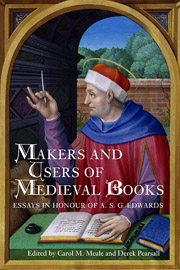Book contents
- Frontmatter
- Contents
- List of Illustrations
- Contributors
- Preface
- List of Abbreviations
- COMPOSITION
- COMPILATION
- PRODUCTION
- OWNERS, PATRONS, READERS
- Trinity College MS 516:A Clerical Historian's Personal Miscellany
- Katherine de la Pole and East Anglian Manuscript Production in the Fifteenth Century: An Unrecognized Patron?
- Past Ownership: Evidence of Book Ownership by English Merchants in the Later Middle Ages
- Early Printed Continental Books Owned in England: Some Examples in the Takamiya Collection
- AFTERLIVES
- A. S. G. Edwards: List of Publications
- Index of Manuscripts and Early Printed Books
- General Index
- Tabula Gratulatoria
Trinity College MS 516:A Clerical Historian's Personal Miscellany
from OWNERS, PATRONS, READERS
Published online by Cambridge University Press: 05 May 2014
- Frontmatter
- Contents
- List of Illustrations
- Contributors
- Preface
- List of Abbreviations
- COMPOSITION
- COMPILATION
- PRODUCTION
- OWNERS, PATRONS, READERS
- Trinity College MS 516:A Clerical Historian's Personal Miscellany
- Katherine de la Pole and East Anglian Manuscript Production in the Fifteenth Century: An Unrecognized Patron?
- Past Ownership: Evidence of Book Ownership by English Merchants in the Later Middle Ages
- Early Printed Continental Books Owned in England: Some Examples in the Takamiya Collection
- AFTERLIVES
- A. S. G. Edwards: List of Publications
- Index of Manuscripts and Early Printed Books
- General Index
- Tabula Gratulatoria
Summary
It is possible to deduce more about Trinity College Dublin MS 516 than about most miscellanies. Its owner and compiler enters his name and place of residence frequently in the book and also dates some of his entries. This is a highly personal compilation, and there is no evidence of anyone else intervening in the book until after the death of the original compiler. Like the compilers of many miscellanies, this man had antiquarian interests, but historical and political concerns appear to have determined in large part his choice of texts. And, because he was primarily interested in historical events and political issues, especially issues concerning the church, dates can frequently be assigned to the individual items he collected, and to when they were copied. It is therefore possible to get closer to the compiler of this miscellany than is usually the case, and to make informed judgments about his personal concerns – some of which appear, in retrospect, to be unusual.
The manuscript consists of 224 folios of parchment and paper, measuring approximately 22 × 15 cm, but there is a bit of unevenness in the size of some of the pages and the paper leaves show a variety of watermarks, as if small stocks of paper were purchased as needed.
- Type
- Chapter
- Information
- Makers and Users of Medieval BooksEssays in Honour of A.S.G. Edwards, pp. 121 - 131Publisher: Boydell & BrewerPrint publication year: 2014



